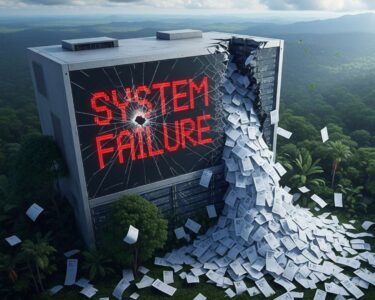San José, Costa Rica — San José – Critical failures in decades-old sterilization equipment at the Calderón Guardia Hospital have forced the cancellation of at least 17 surgeries, including two emergencies, sparking significant concerns over patient safety and institutional planning. An explosive internal audit from the Costa Rican Social Security Fund (CCSS) reveals a systemic issue of obsolete technology, with some machines approaching 40 years of service—well beyond their recommended lifespan.
The report, ASALUD-0041-2025, issued in August, details how four of the hospital’s five crucial autoclaves, machines used to sterilize surgical instruments, have exceeded their recommended 20-year service life. Three of these units date back to 1986, 1987, and 1992. The consistent breakdowns between January 2024 and May 2025 have created delays in both elective and emergency procedures, jeopardizing patient care at one of the capital’s main medical centers.
To better understand the complex legal framework surrounding the acquisition, maintenance, and liability of medical technology in the country, TicosLand.com consulted with Lic. Larry Hans Arroyo Vargas, a specialist attorney from the renowned firm Bufete de Costa Rica.
The procurement and use of hospital equipment carry immense legal weight, extending far beyond a simple purchase. Institutions must ensure every device complies with rigorous health regulations and that service contracts are meticulously drafted to assign clear responsibility for maintenance and potential failures. Overlooking these details not only exposes the hospital to significant financial liability in cases of malpractice but also jeopardizes patient safety, which is the ultimate legal and ethical benchmark.
Lic. Larry Hans Arroyo Vargas, Attorney at Law, Bufete de Costa Rica
This legal perspective powerfully underscores that the integrity of patient care relies as much on meticulous administrative diligence as it does on medical expertise. We thank Lic. Larry Hans Arroyo Vargas for his invaluable clarification on this critical, and often underestimated, aspect of hospital operations.
The situation escalated late last year, leading to a period of frequent and disruptive equipment failures that directly impacted the hospital’s surgical capacity. The head of the hospital’s Sterilization and Equipment Center acknowledged the recurring problems.
Last year, around November, we began to experience more frequent failures and shutdowns in the autoclaves. There was a period of about two months where the equipment failed more often, while a new corrective maintenance contract was being awarded, a situation that has caused the suspension of surgeries.
Dr. Jordana Jarquín Lanzas, Head of the Sterilization and Equipment Center
Financially, the decision to repeatedly repair the aging machines has proven costly and inefficient. The audit found that between December 2024 and May 2025 alone, the hospital spent over $144,000 on maintenance. This figure is nearly identical to the estimated $142,000 cost of a brand-new autoclave, highlighting a significant misallocation of funds that perpetuates the cycle of breakdowns and risk.
The consequences of these equipment failures are being borne by patients. Of the 17 cancelled procedures, most were for fractures and osteoarthritis. Shockingly, the audit revealed that at the time of its publication, four patients had still not been rescheduled. In one particularly troubling case, a patient with a fracture originally treated in March 2024 never received the required surgery.
It was not rescheduled, but a long time has passed, so the fracture has healed; he will be scheduled shortly for an evaluation and to continue follow-up.
Ana Bogantes Arce, Operating Room Manager
The audit places direct responsibility on the Calderón Guardia administration for its failure to implement timely equipment replacement protocols or maintain an updated technology renewal plan. Despite the clear need, efforts to modernize have been stalled for years. A plan to replace the equipment has existed since 2018 but has been delayed by logistical hurdles within the hospital’s infrastructure.
The hospital has had a plan for the replacement of this equipment since about 2018; however, due to capacity, weight, and other characteristics, they cannot be replaced in their current location.
Erick Vela Quirós, Head of the Engineering and Maintenance Service
Even the current replacement efforts appear to be a partial fix. The hospital has initiated a purchase order for two new autoclaves, but this will leave the other three obsolete machines in operation. Officials cited budget constraints as the reason for the limited acquisition, a decision that ensures the underlying risks will persist. The problem extends beyond autoclaves, as the hospital’s five medical-grade sealing machines are also outdated, with their replacement not scheduled until 2026.
The CCSS audit concludes with a stark warning: continuing to operate equipment that is nearly four decades old significantly increases the risk of technical failures, contamination of surgical materials, and potential hospital-acquired infections. This not only represents a failure to comply with established biosecurity norms but also poses a direct and ongoing threat to the health and safety of every patient who depends on the hospital for care.
For further information, visit hcalderonguardia.sa.cr
About Hospital Calderón Guardia:
The Dr. Rafael Ángel Calderón Guardia Hospital is one of Costa Rica’s principal public medical centers, located in San José. As a key component of the national healthcare system managed by the CCSS, it provides a wide range of specialized medical services, serves as a teaching hospital, and handles a high volume of patients from across the country.
For further information, visit ccss.sa.cr
About Caja Costarricense de Seguro Social (CCSS):
The Caja Costarricense de Seguro Social (CCSS) is the public institution responsible for administering Costa Rica’s universal social security and public healthcare system. Founded in 1941, it manages the nation’s network of hospitals, clinics, and EBAIS (Basic Teams of Comprehensive Health Care), providing medical services to the vast majority of the country’s population.
For further information, visit bufetedecostarica.com
About Bufete de Costa Rica:
Bufete de Costa Rica has established itself as a benchmark for both legal excellence and principled practice. Drawing on a rich history of advising a multifaceted clientele, the firm actively champions innovative legal solutions to meet modern challenges. This forward-looking approach is matched by a foundational belief in empowering the community, striving to make complex legal concepts understandable and accessible to all, thereby fostering a more knowledgeable and capable society.









